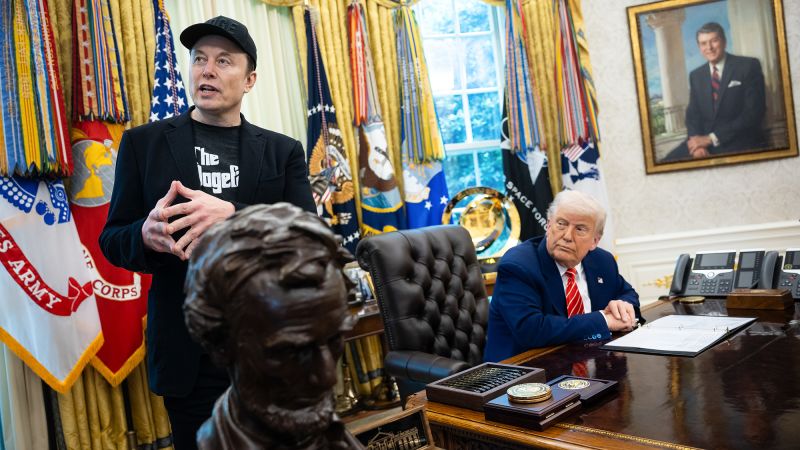The financial landscape surrounding Tesla and its CEO Elon Musk is particularly volatile, especially in the wake of political shifts that can significantly affect market sentiments. Following the November presidential election, Tesla’s stock (TSLA) experienced an impressive surge, largely propelled by investor optimism regarding the prospect of favorable policies from then President Donald Trump. Stakeholders believed that Trump’s administration would fortuitously align with Musk’s interests, given that Musk was a substantial financial supporter of Trump. However, this perceived investment-friendly environment is now being overshadowed by the potential risks that could stem from Trump’s administration itself, particularly in light of the recent public feud between Trump and Musk, which contributed to a notable 14% decline in Tesla shares on a Thursday trading session.
This turbulent relationship between the two powerhouses raises questions not only about Tesla’s financial stability but extending to Musk’s other ventures including SpaceX—a company that primarily relies on government contracts to fund a significant part of its operations. Musk’s portfolio also encompasses platforms and technologies such as social media platform X (formerly Twitter), the artificial intelligence firm xAI, and Neuralink, which specializes in brain-computer interfaces. All of these entities are subject to regulatory oversight, emphasizing the precarious balance Musk must maintain with government relations.
Additionally, Musk finds himself at the center of potential investigations by regulatory bodies such as the Securities and Exchange Commission (SEC). The SEC is reportedly examining Musk’s actions regarding his acquisition stakes in X prior to his takeover attempt. Trump’s recent statements, particularly made on his own social media platform Truth, hinted at curtailing Musk’s governmental subsidies and contracts, a strategy Trump suggested could save billions for the government.
Responding to Trump’s threats, Musk humorously retorted via Twitter, expressing an air of defiance and suggesting that such moves could be met with confidence rather than concern. Despite Tesla being involved in fewer government contracts, the impact of federal policies is substantial. A significant example includes a $7,500 tax credit for electric vehicle purchases, crucial for Tesla’s pricing strategies in a competitive market. This tax incentive drastically enhances consumer appeal and Tesla’s bottom line, with estimates suggesting this could equate to billions for the company annually.
Furthermore, alongside the issue of tax credits, Tesla also generates considerable income by selling regulatory credits to other automakers, aiding their compliance with emission standards. However, if Trump were to implement policies that rollback these environmental regulations, it could dramatically diminish the market for these credits. Financial assessments, such as a report from JPMorgan, indicate that the potential loss of such credits could cost Tesla upwards of $3.2 billion annually—$1.2 billion from lost EV tax credits and an additional $2 billion from regulatory credit sales.
In parallel with Tesla’s uncertain future, Musk’s ambition for a self-driving taxi service hinges on the successful rollout of their current “full self-driving” technology. This technology, while groundbreaking, still mandates the presence of a human driver, and any regulatory constraints could limit prospective growth. Moreover, investigations initiated by federal traffic safety authorities into existing Tesla vehicles could complicate Musk’s aspirations, particularly if a more regulatory-friendly Trump administration fails to materialize as expected.
SpaceX also faces vulnerabilities under current political circumstances. The firm has accumulated significant contracts—$15.2 billion from NASA and $5.8 billion from the Department of Defense—including smaller contracts from other entities. However, the landscape of these contracts is not secure, as alternatives to SpaceX are limited. For instance, Boeing, which serves as another participant in astronaut transportation to the International Space Station, recently experienced challenges that left astronauts stranded for extended periods. On top of that, NASA and the Federal Aviation Administration (FAA) oversee SpaceX’s operations, while the Starlink satellite service seeks regulatory approval from the Federal Communications Commission (FCC) to expand.
In summary, as we navigate through this intricate interplay of business and politics, Tesla’s financial future and Musk’s entrepreneurial endeavors remain deeply entwined with the whims of regulations and governmental policies. The ongoing dynamic between Musk and Trump exemplifies the unpredictable nature of modern economics driven by political landscapes, with potential consequences that could reverberate through Musk’s various enterprises.



